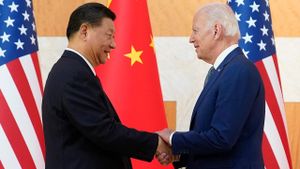Donald Trump’s recent re-election as President of the United States has sparked significant interest and speculation within the cryptocurrency sector. Following his campaign which largely centered around pro-cryptocurrency sentiments, the market has responded positively, seeing Bitcoin reach unprecedented heights. These changes signal potential shifts not only for cryptocurrency investors but also for policymakers who aim to navigate this increasingly complex digital finance ecosystem.
On November 5, the United States once again elected Donald Trump president, and the immediate aftermath was electric, especially for Bitcoin. Running on a platform promising less regulation and accelerated growth for cryptocurrencies, Trump's victory allowed Bitcoin (BTC) to surge to new heights, peaking at $79,954 on November 10, reflecting its astronomical increase of 89.2% year-to-date. This unexpected market rally sent clear signals to institutional investors, many of whom are now reconsidering their stance on Bitcoin and digital assets.
Gary Gensler, the current chairman of the Securities and Exchange Commission (SEC), is at the forefront of discussions about regulatory standards affecting cryptocurrencies. Though Trump cannot terminate Gensler’s contract without cause until it ends in 2026, he has promised to remove him at the beginning of his new term. Among those touted as potential successors for the SEC's chairmanship is Dan Gallagher, who has publicly criticized Gensler's approach to crypto regulation. Gallagher, who is currently Robinhood’s Chief Legal and Compliance Officer, has argued for changes to what he views as the SEC’s overly aggressive regulatory stance.
Regulatory adjustments have also beenechoed by Charles Hoskinson, founder of Cardano, who has expressed intentions to set up the U.S. crypto policy office within his company, Input Output. Describing the current political climate as “the best opportunity” for clarity within the crypto sector, Hoskinson is optimistic about collaborating with lawmakers to establish regulations shaped by the industry rather than by external financiers like BlackRock. His views align with sentiments from Ripple CEO Brad Garlinghouse, who has previously criticized the SEC's regulatory tactics, asserting they could push innovation out of the U.S.
The political shakeup prompted by Trump's election has coincided with tangible growth within the cryptocurrency markets. The market capitalization of crypto rose significantly following the election, reflecting renewed investor confidence. Lawmakers who have voiced support for cryptocurrency—268 pro-crypto candidates were elected to the House and 19 to the Senate—suggest potential collaboration toward creating friendlier policies for cryptocurrencies. This shift could move the United States closer to becoming a leading hub for cryptocurrency innovation.
There's also discussion around exchange-traded funds (ETFs) which have seen record inflows following the election results. Bitcoin ETF products have benefited tremendously from the election aftermath, with nearly $621 million flowing immediately, followed by $1.38 billion the next day, marking the highest intraday inflow since their introduction earlier this year. The momentum suggests institutions are betting heavily on Bitcoin’s prolonged viability and growth within their investment strategies.
Though Trump's campaign was considered controversial by some, his backing of cryptocurrencies could catalyze significant investment and innovation. The Republican party's anticipated majority control of Congress underlines the possibility of favorable legislative measures promoting digital asset investment and protection from overregulation.
Crypto-friendly initiatives under Trump’s leadership may pave the way for more sustainable frameworks for the burgeoning industry. Crypto advocates, including those at Coinbase and leading figures like Hoskinson, are eyeing potential legislative changes closely. Should these regulations come to fruition, they could provide definitive guidance on what constitutes security versus commodity within the crypto space.
The recent election result has not only caused Bitcoin's market prices to soar but has also provided clarity on trading operations for many investors. Interestingly, meme-based tokens and coins reflecting Trump's image have also seen gains—yet another example of cryptocurrency's growing intersection with political events.
Despite some doubting Bitcoin's role as money, Trump's administration seems to bring renewed support from financial sectors, signaling it could transform future financial landscapes. For many, this transformation is viewed as potentially setting cryptocurrency on the right track toward mainstream acceptance.
Curiously, even as the sector thrives, concerns about volatility and regulatory scrutiny linger. While Bitcoin saw price hikes, skepticism about potential repeat crashes remains. This uncertain perspective will likely influence investor behavior moving forward.
Analysts predict continuing bullish trends as discussions about cryptocurrency regulations and policies evolve. Anticipation around digital currency frameworks may also accompany the growing trend of Bitcoin being viewed as "digital gold," solidifying its status as not just speculative but as fundamental to diverse investment portfolios.
Looking beyond the election-induced surge, Bitcoin's developments are spurred by global recognition and adoption, reinforcing its legitimacy as an asset. Institutional efforts to understand and integrate Bitcoin investment strategies are underlined by improvements to custody solutions and derivative markets, making the asset more accessible than ever.
Once dismissed as fringe or speculative, Bitcoin is solidifying its position as part of the financial mainstream, making it hard for traditional institutions to ignore. With Bitcoin's halving event approaching and another bull market seemingly on the horizon, the possible infusion of administrative policies expected to ease market entries could lead to significant growth.
The fusion of politics and cryptocurrency is taking shape, with renewals of interest promising to reshape financial landscapes. Observers around the world are left waiting to see how these developments will play out for investors and consumers alike as the future of cryptocurrency hangs tantalizingly just out of reach.
Trump's administration hints at coming changes for the cryptocurrency ecosystem, potentially aligning the sector with growth opportunities across the globe. If successful, these new approaches could mark the beginning of unprecedented growth for cryptocurrencies across financial landscapes.



